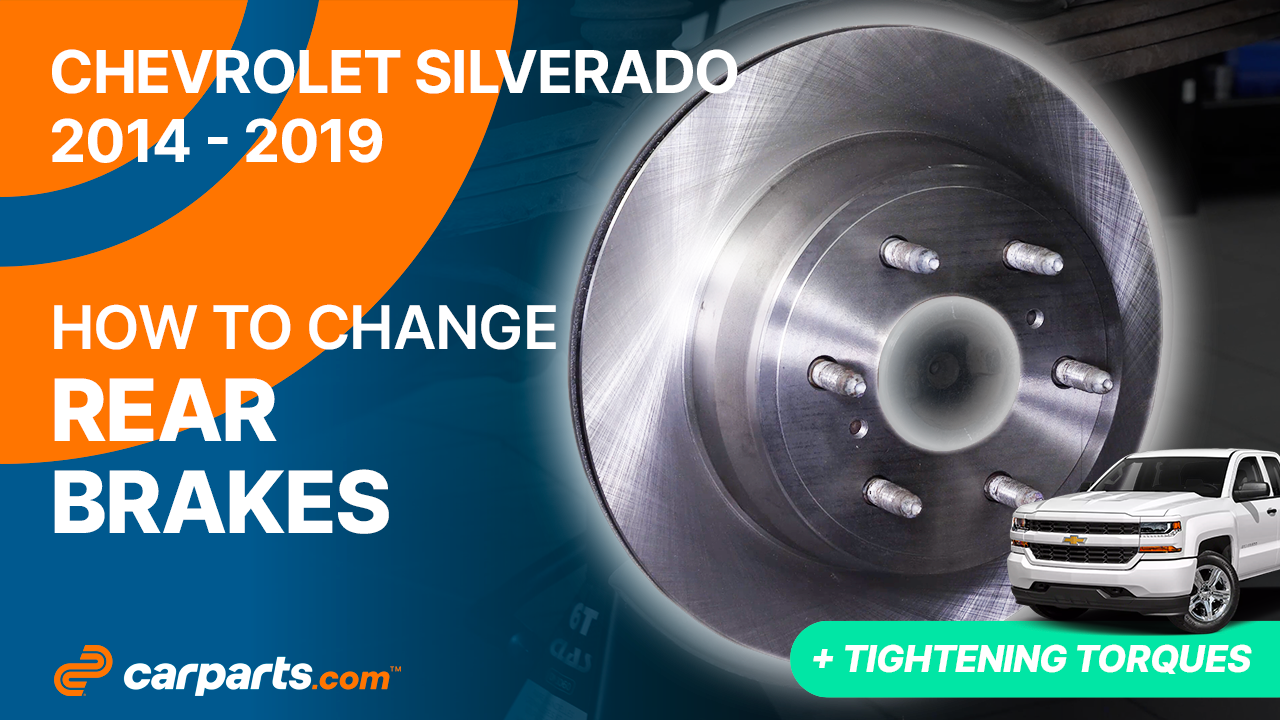
How to replace the rear brakes 2014 – 2019 Chevrolet Silverado 3
To replace the rear brakes on your Silverado 3 just follow the steps. You will be asked to open the hood, open the brake fluid reservoir, remove the brake caliper as well as carry out a few other steps. You can carry out this tutorial of 20 chapters in 60 minutes. Bring your 18 mm socket and your brake wind-back Tool and let’s get started!
Duration
60 minutes
Number of steps
20
Difficulty out of 5
2
Average savings
$80
Parts You Will Need
Tools You Will Need
Step-by-Step Installation
Chapter 1:
Open the brake fluid reservoir
Step 1/2
Turn off your vehicle’s ignition, set the parking brake, pull the hood release handle and open the hood.





Chapter 1:
Step 2/2
Open the brake fluid reservoir.

Chapter 2:
Lift the vehicle
Step 1/3
Loosen the wheel lug nuts on the rear wheels.

Chapter 2:
Step 2/3
Lift the rear of your vehicle. Place the vehicle on the jack stands.



Chapter 2:
Step 3/3
Don’t forget to put the wheels under the vehicle!

Chapter 3:
Loosen the parking brake
Step 1/1
Before you start, release the parking brake otherwise the operation will be impossible.

Chapter 4:
Remove the brake caliper
Step 1/4
With a 13mm wrench, unscrew the slide pins. Sometimes you have to keep the locknut from turning by holding it with your fingers or a 20 mm wrench.



Chapter 4:
Step 2/4
Finish unscrewing by hand.

Chapter 4:
Step 3/4
You can now remove the caliper.

Chapter 4:
Step 4/4
You can now place the brake caliper on the leaf springs.

Chapter 5:
Remove the brake pads
Step 1/1
Remove the brake pads by prying them out with a flathead screwdriver. Then, remove the anti-rattle clips.





Chapter 6:
Remove the brake caliper mount
Step 1/2
Using a socket wrench and a 18mm socket, unscrew the two holding bolts on the caliper mount. Depending on the state of the bolts on the caliper mount, it may be necessary to use a hammer to loosen them.





Chapter 6:
Step 2/2
Remove the caliper mount.

Chapter 7:
Remove the brake disc
Step 1/1
Sometimes the disc may get stuck on the hub, if this happens, use a hammer to remove it. Finally, remove the disc.


Chapter 8:
Clean
Step 1/1
Clean the wheel hub with a wire brush, brake cleaner and paper towels.





Chapter 9:
Set up
Step 1/1
Before installing the new disc, it is vital to clean it using brake cleaner and paper towels to take off the storage paraffin. If your new disc is coated, you can place it directly onto the wheel hub.





Chapter 10:
Clean the brake caliper mount
Step 1/2
Brush the caliper mount around the pads to remove any extra rust that could prevent the pads from sliding.


Chapter 10:
Step 2/2
Also brush the caliper mount retaining bolts, then apply medium-strength threadlocker to prevent accidental unscrewing.

Chapter 11:
Put the brake caliper mount back on
Step 1/2
Reassemble the caliper mount by screwing first by hand, then with a socket wrench and a 18mm socket to lock them in place.






Chapter 11:
Step 2/2
Finish tightening using a torque wrench.

Chapter 12:
Place the new anti-rattle clips
Step 1/2
Get hold of the anti-rattle clips supplied in the kit.

Chapter 12:
Step 2/2
Place the new anti-rattle clips on the caliper mount.


Chapter 13:
Place the new brake pads
Step 1/2
Grab the new pads, and lightly coat the ends with copper grease to help them slide more easily.


Chapter 13:
Step 2/2
Insert the new pads into the caliper mount by sliding them in.



Chapter 14:
Press the piston
Step 1/1
Press the piston into the brake caliper.


Chapter 15:
Informations
Step 1/1
For this operation, it is essential to have a brake wind-back tool, a special tool that allows you to push the piston back, making it easier to put the caliper back in place. This step is essential before installing the new pads. As the piston enters the brake caliper, brake fluid will flow back into the brake fluid reservoir. Depending on the original level of the reservoir, make sure that the liquid does not overflow.


Chapter 16:
Put the brake caliper back
Step 1/3
You need to check the sliding of the brake caliper slide pins and the condition of the Caliper slide pin boots. If they look worn, you are advised to replace them with new ones. Put the brake caliper back in place and screw in the slide pins, by hand at first.



Chapter 16:
Step 2/3
Screw them in using 13mm wrench. You can use a 20mm wrench to prevent the bolts from rotating.


Chapter 16:
Step 3/3
Finish tightening using a torque wrench.

Chapter 17:
Clean
Step 1/1
Clean the disc with brake cleaner and a cloth to remove the grease from the new pads.

Chapter 18:
Passenger side
Step 1/1
You can now repeat the same process on the other side.

Chapter 19:
Put the vehicle back on the ground
Step 1/3
Then, you will be able to put the wheels back on your vehicle.

Chapter 19:
Step 2/3
Put the car back on the ground and block the wheels properly.


Chapter 19:
Step 3/3
Don’t forget to screw the brake fluid cap back on before starting the car.

Chapter 20:
Safety tips
Step 1/3
Attention! Before using your vehicle again, start your car, and pump the brake pedal a few times to push the brake pads together again.


Chapter 20:
Step 2/3
Try to drive smoothly and avoid sudden braking for the first 30 miles or so, to avoid glazing the new pads.

Chapter 20:
Step 3/3
Operation complete.
